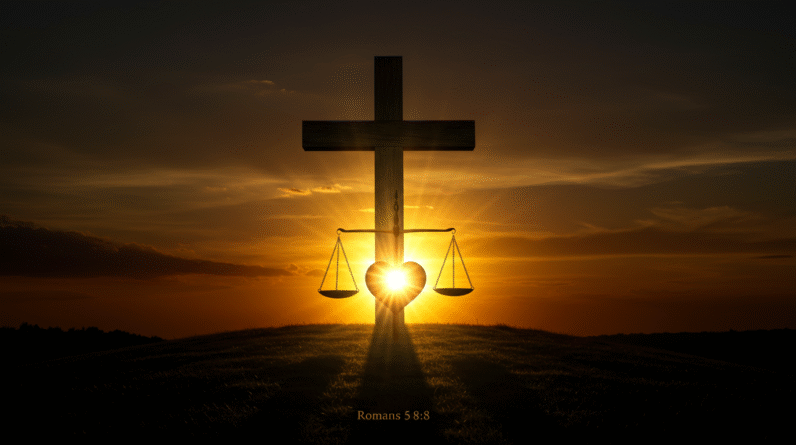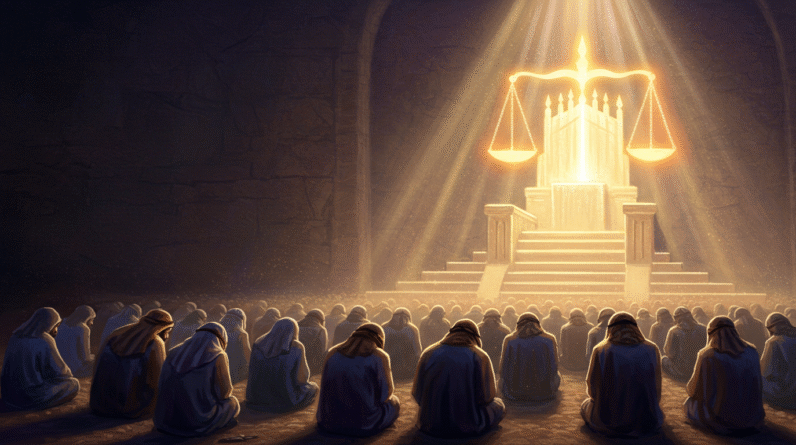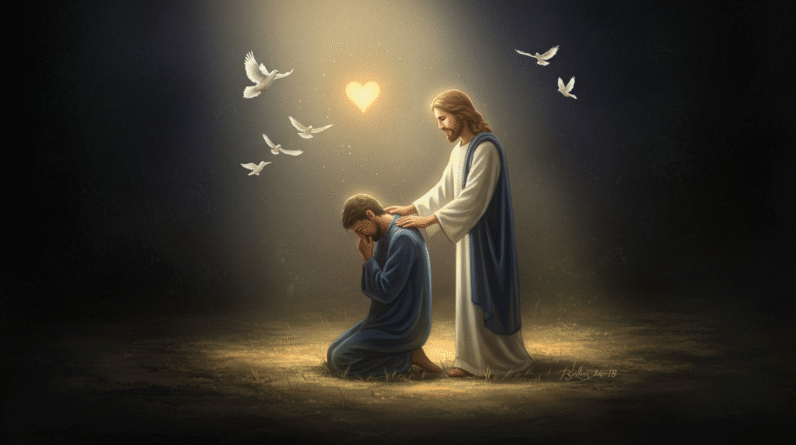God’s Love And Justice In Eternity (Revelation 21:4)
You’ve come seeking truth about how God’s love and justice meet in eternity. That’s no small question. It touches the deepest longings and fears in your heart — the desire for mercy, the longing for fairness, and the hope that sorrow and pain will end. The Bible brings these realities together in one of the most comforting promises you’ll ever read: “He will wipe every tear from their eyes. There will be no more death or mourning or crying or pain” — a picture of eternity that blends love and justice in a way that satisfies both your soul’s need for compassion and your conscience’s need for righteousness. See Revelation 21:4.
In what follows, you’ll walk through Scripture with me, balancing God’s tender compassion and His holy righteousness. I’ll point you to passages that show love and justice working together, explain how they’re reconciled in Christ, and help you apply these truths to your life and your hope of eternity. You’ll find Bible references throughout, so you can read the verses in context on a trusted site like Bible Gateway. Let’s begin this study together.
The Promise in Revelation: Comfort for Your Grief
When you read Revelation 21:4, you hear a promise meant to remove fear and lighten sorrow. The image is intimate — God Himself wiping away your tears. That simple, powerful act tells you two things: first, God knows your pain; second, He has the authority to end it. Revelation is a book of endings and new beginnings, and in chapter 21, you are shown an eternal state where pain is undone and righteousness reigns.
This promise is not a vague sentiment. It assumes real grief, real loss, and a real solution. The one who brings the new heaven and new earth is both loving and just. You must hold both attributes together: the God who wipes away tears is also the God who judges righteously. The comfort of Revelation 21:4 rests on the character of God — His tenderness toward the suffering and His commitment to fix what is wrong.
Understanding God’s Love in Scripture
God’s love is active and sacrificial
You’ll find the clearest statement of God’s love in the words Jesus spoke that have been echoed through Christian faith: “For God so loved the world that he gave his one and only Son” — a love that acts by giving. Read this familiar promise and let it sink in: John 3:16. This love is not distant; it’s a costly, personal movement toward you.
When you study the New Testament, you see God’s love displayed most plainly in Christ’s death and resurrection. Romans explains how God’s love confronts the need for justice — the problem of sin — and yet satisfies it through the cross. See Romans 5:8 and Romans 3:23-26. In these passages, you learn that God’s love saves you, but not by canceling justice. Rather, His love honors justice by providing a sacrificial solution.
Love that forgives and restores
You might worry that justice leaves no room for mercy. Scripture shows otherwise. The Psalms sing of a God who is “compassionate and gracious” — slow to anger and abounding in love. Read Psalm 103:8-12 and you’ll see how mercy reaches into your need, removing your guilt and restoring you. God’s love forgives freely, but it does so in a way that upholds His holiness.
The parable of the prodigal son is an exquisite portrait of this love in action: a father who welcomes back a wayward child, robes him, and restores him to the family seat. Read it with your heart open: Luke 15:11-32. You’ll see grace that doesn’t cheapen responsibility but embraces the repentant and repairs relationships.
Understanding God’s Justice in Scripture
God’s justice is moral and relational
You might think of justice as mere punishment, but Scripture presents it more broadly: God’s justice restores what is broken and sets things right in creation and in relationships. The prophets speak boldly about God’s demand for righteousness and justice to prevail. Micah’s challenge cuts to the heart of faithful living: “What does the Lord require of you? To act justly and to love mercy and to walk humbly with your God.” Read Micah 6:8. Justice, in God’s economy, includes compassion for the vulnerable and a commitment to truth.
Divine justice also means that wrong things are not simply ignored. Psalm 89 declares that righteousness and justice are the foundation of God’s throne, showing that God’s rule is inherently fair: Psalm 89:14. You can trust that God’s governance is not arbitrary.
God’s justice will be executed
The Bible teaches that God will one day judge all things openly and fairly. Revelation paints a scene in which every deed is brought into the light. Read Revelation 20:11-15 to see the solemnity of that day. This is not mere retribution; it is the act by which God removes the stain of evil from His universe and establishes an everlasting order of righteousness.
Jesus Himself spoke of judgment that separates the sheep from the goats — a depiction that underscores both the ethical dimension of justice and the moral consequence of how you treat others: Matthew 25:31-46. Here, you cannot separate belief from behavior; justice involves how you live out love toward neighbors.
How God’s Love and Justice Work Together
Mercy without justice would be empty; justice without mercy would be crushing
If God simply overlooked sin, His love would be sentimental and would not heal the world’s brokenness. If God only punished, there would be no hope for the repentant. But the Bible shows a God who is both loving and just, and who resolves this tension in Christ. The cross is the place where God’s justice and God’s love meet. In Christ, the penalty for sin is paid, and mercy is extended to you. Consider 2 Corinthians 5:21 and Romans 3:23-26 again; these passages explain how Christ bore your sin so you might be declared righteous before God.
You should never think of God’s love as antipathy toward justice. Rather, His love expresses justice by providing atonement. The atonement preserves God’s holiness and opens the door for His mercy to be rightly received. The result is a holiness that is not cold but restorative, a justice that is not vindictive but redemptive.
The cross: where both attributes are satisfied
You may wonder how God can be both perfectly loving and perfectly just. The answer lies in the gospel. The cross does what neither attribute could do alone: it upholds God’s righteousness while releasing mercy. Romans 5:8 tells you that God demonstrates His love through Christ’s death for you, while other passages show that the death of Christ satisfies the demands of justice. In short, the cross guarantees that the comfort of Revelation 21:4 does not come at the expense of truth. It comes because truth has been honored and satisfied.

The Shape of Eternity: Love Perfected, Justice Fulfilled
No more death, no more pain — a righteous end to suffering
When Revelation describes the new heaven and new earth, it is not promoting lawlessness or a sentimental fantasy. It is declaring that God will bring history to its rightful conclusion. What you see in Revelation 21:4 is a culmination of God’s restorative work. God’s justice has cleansed and corrected, and His love now dwells with His people in perfect harmony.
The prophets foresaw the day when justice would roll down like waters and righteousness like an ever-flowing stream. See Amos 5:24. This poetic picture is fulfilled in the new creation where wrongs are made right, and mercy and truth meet in a glorious reconciliation.
The peace of God that endures
The eternal state is characterized by peace — not a fragile ceasefire but a deep, unshakeable peace that flows from God’s presence. Jesus promised His peace to His disciples: “Peace I leave with you; my peace I give you.” Read John 14:27. That promise reaches its fulfillment in eternity when sorrow and pain are gone and the peace of God reigns forever. This peace is the fruit of both God’s love and His righteous rule.
Practical Implications for Your Life Now
Live under God’s mercy and stand for His justice
Understanding the balance of God’s love and justice has practical consequences for how you live every day. You’re called to receive God’s mercy and to extend it to others. But you’re also called to pursue justice — to stand up for the vulnerable, to be honest, to hold fast to truth. Micah’s words are as relevant for you now as they were then: act justly, love mercy, walk humbly with God (Micah 6:8).
Your faith will be tested by how you navigate the tension between grace and righteousness in relationships, work, and community life. The gospel frees you from hypocrisy: you don’t pretend to be righteous, yet you are empowered to live righteously by the Spirit. Reflect on Ephesians 2:4-5 and let the truth that God’s love has made you alive influence your choices.
Seek reconciliation and accountability
Because God’s justice restores relationships, you should pursue reconciliation where there is conflict. The cross calls you to confess, forgive, and restore. But reconciliation doesn’t mean ignoring wrongdoing. Where sin exists, truth and accountability are necessary. James reminds you that mercy triumphs over judgment, but that mercy is extended in a spirit that acknowledges sin and turns to God (James 2:13). You are invited into the hard work of loving others while upholding what is right.
Live with the end in view
The promise of Revelation should shape how you live now. When you are tempted to despair, remember that sorrow is temporary and glory is coming. Scripture says there is now no condemnation for those who are in Christ Jesus (Romans 8:1). Hold to that assurance: God’s justice has been satisfied through Christ, and God’s love will bring you into an eternal reality where everything broken is made new.
Bible Study Lessons: Balancing Compassion and Righteousness
Lesson 1 — Read Revelation 21:1-5 in context
Start your study by reading Revelation 21:1-5. Let the vision of the new heaven and new earth sink into your imagination. Ask: What elements of hope do you find here? How does John describe God’s presence among His people? Note the personal tenderness in the promise that God will wipe away every tear (Revelation 21:4) and discuss how this promise interacts with the reality of God’s judgment elsewhere in Revelation.
Lesson 2 — Study the cross as the meeting point of love and justice
Turn to Romans 3 and 5 and study how Paul explains God’s righteousness and righteousness through faith. Read Romans 3:23-26 and Romans 5:8. Ask: How does the cross satisfy the demands of justice while allowing mercy to be extended? How does this inform your understanding of Revelation’s promises?
Lesson 3 — Explore Old Testament pictures of justice
Read Amos 5:24 and Psalm 89:14 with your group or study journal. Consider the prophetic demand that justice should prevail and how that demand reflects God’s heart. See Amos 5:24 and Psalm 89:14. Discuss examples in your community where justice is needed and how your faith can respond practically.
Lesson 4 — Study Jesus’ parables on mercy and righteousness
Read the parable of the prodigal son (Luke 15:11-32) and the sheep and the goats (Matthew 25:31-46). Ask: What do these stories teach about how love and justice should shape community life? How does practical compassion relate to final judgment?
Lesson 5 — Apply the theology to your context
Use Ephesians 2:4-5 (Ephesians 2:4-5) and James 2:13 (James 2:13) to discuss the tension between grace and works. How can your church be a place where mercy is extended without neglecting the call to holiness and justice? How can you personally demonstrate both compassion and a commitment to truth?
Pastoral Encouragement: If You’re Hurting
God sees your tears
If you’re reading this in the midst of pain, know that God sees and cares deeply about your suffering. The promise in Revelation 21:4 is meant for you. The same God who promised to wipe away tears and abolish pain is the God who comforts you now through His Spirit. Turn to Psalm 46 when you need assurance: God is your refuge and strength, an ever-present help in trouble (Psalm 46:1).
Hope is anchored in Christ
You have a reason to hope because justice will be served and love will be perfectly expressed in eternity. The cross shows that God is both just and loving, and that He has acted to secure your future. Romans 6:23 puts it plainly: “For the wages of sin is death, but the gift of God is eternal life in Christ Jesus our Lord” (Romans 6:23). If you are trusting in Christ, remember that His sacrifice has purchased the promise of eternal comfort.
Practical comfort and community
You are not meant to carry grief alone. The Christian community is called to embody God’s compassion and to bear one another’s burdens. Reach out to others for prayer, for practical help, and for presence. If guilt tempts you to despair, remember God’s invitation to forgiveness and restoration in passages like 2 Corinthians 5:21.
When Justice Feels Harsh: Wrestling With Difficult Questions
Why does a loving God judge at all?
That’s a legitimate, honest question. Love without justice would let evil continue unchallenged; justice without love would be merciless. God’s judgment is the means by which He takes sin seriously and restores the good of creation. Hebrews reminds you that God is a consuming fire when it comes to sin (Hebrews 12:29). At the same time, God’s judgment is not capricious; it is rooted in His holy love for what is right.
Is there a way for everyone to be saved?
Scripture is clear that God desires people to turn to Him; He is patient and calls all to repentance. Verses like 1 Peter 1:17 and the sober pictures of final judgment in Revelation tell you that there are consequences for rejecting God’s mercy. But the heart of the gospel is this: God has made a way through Christ. The invitation stands — and your response matters.
Living in Light of Eternity
Let truth and love guide your witness
When you understand that God’s love and justice meet in Christ, your life should reflect that harmony. You’ll speak truth with compassion and stand for justice with humility. Galatians teaches justification by faith, not by works alone, but genuine faith produces transformation that shows itself in deeds (Galatians 2:16). Be a person who knows the mercy you have received and lets that shape your actions toward others.
Persevere in hope
Hold to the promise that one day God will wipe away every tear. Let that hope steady you in trials. The Christian journey is marked by both struggle and assurance: struggle because sin remains, and assurance because Christ has secured the victory. Let Scripture root you: “Romans 8:1 — no condemnation for those in Christ.” Whenever fear creeps in, return to God’s Word and to prayer.
A Final Word: The Gospel as Reconciliation of Love and Justice
The good news is that God’s love does not nullify His justice; it fulfills it. In the person and work of Jesus Christ you see the divine merciful heart and the righteous judge reconciled. The cross stands at the center of history as the means by which you can be forgiven and by which the universe will be set right. Read Romans and the Gospel of John with humility and hope. Let the story of redemption guide your life and give you confidence in the promise of Revelation.
If you do not yet know Christ personally, this is the time to consider the invitation seriously. God’s love seeks you; His justice is satisfied in Christ. Your response opens the door to the comfort of Revelation 21:4 and to an eternity where tears are no more (Revelation 21:4).
If you are already walking with the Lord, let this truth deepen your worship and shape your service. Let mercy and justice mark your community and your witness so others may see the beauty of God’s character lived out.
Closing Prayer and Encouragement
May you be comforted by the God who sees your pain and promises a future free from sorrow. May the knowledge of His justice not frighten you but assure you that all wrongs will be made right. And may His love compel you to live a life of mercy, humility, and truth until the day you stand with Him in the new heavens and the new earth.
Explore More
For further reading and encouragement, check out these posts:
👉 7 Bible Verses About Faith in Hard Times
👉 Job’s Faith: What We Can Learn From His Trials
👉 How To Trust God When Everything Falls Apart
👉 Why God Allows Suffering – A Biblical Perspective
👉 Faith Over Fear: How To Stand Strong In Uncertain Seasons
👉 How To Encourage Someone Struggling With Their Faith
👉 5 Prayers for Strength When You’re Feeling Weak

📘 Jesus and the Woman Caught in Adultery – Grace and Mercy Over Judgement
A powerful retelling of John 8:1-11. This book brings to life the depth of forgiveness, mercy, and God’s unwavering love.
👉 Check it now on Amazon
As a ClickBank & Amazon Affiliate, I earn from qualifying purchases.
Acknowledgment: All Bible verses referenced in this article were accessed via Bible Gateway (or Bible Hub).
“Want to explore more? Check out our latest post on Why Jesus? and discover the life-changing truth of the Gospel!”








